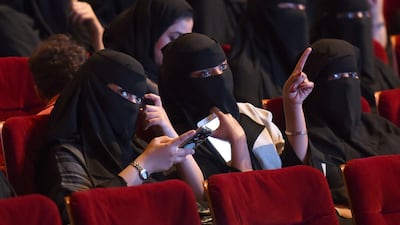When Saudi Arabia first imposed its cinema ban, moviegoers were flocking to watch ET, Michael Jackson's Thriller album had just been released and Time magazine named the computer as its person of the year. Much has changed in the intervening years. The announcement on Monday that the ban will be lifted is one of many changes spearheaded by the 32-year-old Crown Prince Mohammed bin Salman, who sees urgent and wide-ranging reform as a necessity to diversify the country's oil-dependent economy.
In a society with a youth hungry to engage in global conversations and eager to be heard, these changes are logical. They also spell good business sense. The Ministry of Culture and Information says a cinema industry will create more than 30,000 jobs and contribute $24 billion to the economy by 2030, when it is hoped 2,000 screens will be open in more than 300 cinemas. Film companies like Imax and AMC Entertainment Holdings are already eyeing opportunities to open in the first multiplexes in March next year. Cultural producers such as filmmakers will also hope this opening will bring commissions and cash for their projects. Cinemagoers pouring into malls to watch films will naturally spend money in other outlets, giving a boost to multiple industries. As the culture minister Awwad bin Saleh Alawwad says, opening cinemas will "act as a catalyst for economic growth and diversification". That aside, the kingdom has been a key expansion territory for television and film in recent years: the country has the highest YouTube consumption in the world, according to Variety magazine, the latest film releases are already available as pay-per-view offerings via satellite broadcasters and streaming services have also proven immensely popular – all of which suggests the landscape has been changing for some time, even if the view has appeared to remain the same.
There will no doubt be critics among the conservative elements of society, who fear the reforms will threaten Saudi's religious identity, but what the crown prince has recognised is that progress is impossible without change. That was the driving force behind other decisions made by Prince Mohammed this year, notably the announcement of plans to build a megacity and a luxury Red Sea resort as part of a broader opening of the economy. There will, of course, be a knock-on societal effect, as the impact of seeing films on the big screen cannot be overstated. Cinema plays an important role as a social, formative ritual, one which shapes and moulds us, makes us think and prompts discourse. As Haifaa Al Mansour, the first Saudi filmmaker to be nominated for an Oscar, put it simply in these pages: "Cinema is joy." A whole new generation is about to experience that joy on its doorstep for the first time.

